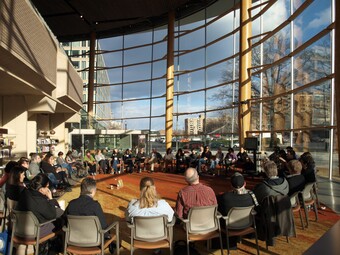LO21
a series of conversations (not actually an office)
The following manifesto was presented as part of the American Voices New Play Institute's 21st Century Literary Office Convening that took place February 24 & 25, 2012 at Arena Stage in Washington, DC. Click here to watch a video of all five manifestos presented to the convening.
The literary office of the future… isn’t actually an office. Sometimes it’s my dining room table during the kid’s first nap—just me and scripts and tea and whatever worlds those playwrights want to take me through. (Sometimes it’s a train seat where I’m reading, sometimes it’s a lobby in our building—but the chairs are always comfy and the light is always good. There are snacks nearby. Because it’s serious business, reading plays.)
So that’s the first thing.
Because other times this literary office is the conversation at a big table in the middle of the office where the folks who plan the season meet—a mix of artistic and production types, a rotating cast of development and marketing types, who are different ages and have different tastes, but who get what it is the theatre is great at, and what it wishes it were great at, and aren’t afraid to argue about it. Our job is to understand the quirks and taste of our artistic director, to be honest about the work we will never do but never complacent in imagining what we might.
Because mission tells a literary office what it does and what it doesn’t do, and any theater worth its salt respects the literary office’s particular talent in keeping the theater from wasting its time or the hopes of artists.
This conversation is a place of curiosity and respect, of fervent passion and honest confusion, disagreement and advocacy and thinking aloud and a constant interrogation of our mission, our purpose, our imagined conversations with our imagined audience alongside our past successes and failures in our actual conversations with our actual community.
For me, this literary office is located in a theater that is big enough to have ambition but small enough to know everyone’s name. A theater that has a mission that’s aspirational—and inspiring—without being masochistic. That knows what it doesn’t do as well as what it does. A theater that values risk—in its programming, sure, but in the interrogation of its mission and the gaps between its mission and its programming. A theater that’s ruthlessly honest about its shortcomings—and expects its employees to be the same.
Because mission tells a literary office what it does and what it doesn’t do, and any theater worth its salt respects the literary office’s particular talent in keeping the theater from wasting its time or the hopes of artists.
But of course at times the literary office is a coffee shop or bar after a reading where you’re winding up or winding down with a writer or director or lit type; it’s the lobby of a theater—your own or not—where you compare notes and dreams with a colleague, and trade pictures of dogs or kids or your latest vacation; it’s the impromptu or long-planned meandering conversations about some cool article on neuroscience or crowdsourcing or habit formation or—perhaps—plays. It’s the cross-time zone phone calls about the heartbreak plays you wish were right for your theater and hope are right for theirs, while hoping to hear about plays you and your theater might fall hard for. It’s the rehearsal hall or production meeting, digging into the details or the big picture that all these conversations lead to.
The literary office is sometimes in museums, in reading non-theatre work, in travel—in making a habit of crossing unfamiliar barriers of culture and aesthetics.
It is a literary office that believes in hard work and deep rest, in using all your vacation time. It is an office lucky enough to rest on the shoulders, brains, and creativity of more than one person—so that we can attend to the theater’s different needs, so that we can offer fresh eyes to our colleague’s projects, so that we can gather more gossip and share.
It is also part of a theater-wide culture of paid sabbaticals. Because what I know I hunger for more than almost anything else is time beyond the to-do list of my work—time to be interesting enough, think broadly enough, to cultivate the kind of insight and innovation that comes from reflection, from worktime away from the cycles of finding and producing work.
We think broadly and abstractly and then we dig into the specifics of scripts and productions, program notes and audience engagement. We go afield. We come home. Everywhere dramaturgy happens is part of the literary office, right?
Because above all, the literary office of the future reckons wisely with the power, responsibility, and deep joy of its work. (Well. It also votes, has fun, and participates in bake sales and the life of its theater, its city, and its field.)







Comments
The article is just the start of the conversation—we want to know what you think about this subject, too! HowlRound is a space for knowledge-sharing, and we welcome spirited, thoughtful, and on-topic dialogue. Find our full comments policy here
I like the image of the portable "office" here. Very apropos to the playwright (me, anyway) as well.